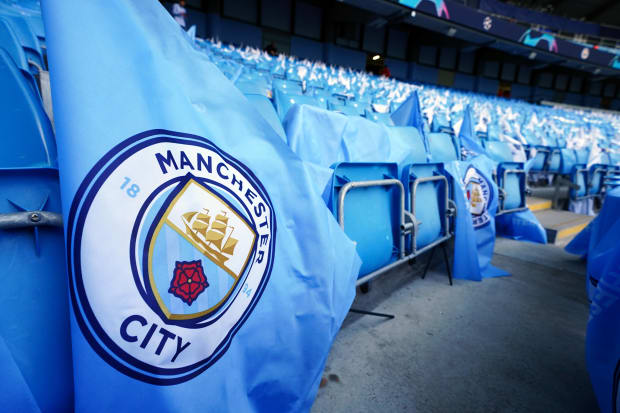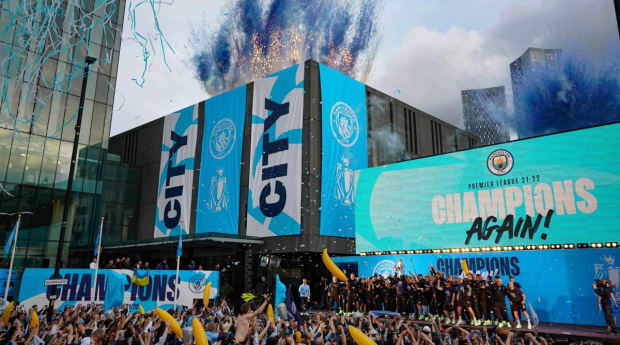A drawn-out process awaits, but what’s clear is that the league has made a loud statement by opposing its most successful club of the last decade.
When the news came, it was in a seemingly bland statement that wasn’t even the lead story on the Premier League website. The Premier League had been investigating alleged breaches of its financial regulations by Manchester City for four years, but there had been no prior indication that today would be the day when charges were brought, or that there would be more than 100 alleged breaches. Exactly what they mean, though, or when there could be consequences, remains unclear.
City released a breezy statement, and said it was not concerned. The club insisted it was “surprised” by the news, “particularly given the extensive engagement and vast amount of detailed materials that the EPL has been provided with.” Nonetheless it welcomes the inquiry as “we look forward to this matter being put to rest once and for all.” Which might be more convincing if City hadn’t been charged by the Premier League with a failure to cooperate, the one offense for which it was eventually punished by UEFA.
The club was banned from the Champions League for two years by UEFA in February 2020 for breaches of Financial Fair Play regulations, only for the Court of Arbitration for Sport (CAS) to determine on appeal that “most of the alleged breaches were either not established or time-barred.” There is no time-barring in the Premier League regulations, nor is there any recourse to CAS.

IMAGO/PA Images
City, indeed, was ordered by an arbitration panel to provide documents and other information to the investigation and then lost a challenge to the legitimacy of the panel in the Court of Appeal. “For the Premier League,” the appeal ruling read, “it was submitted that the tactic that the club has adopted has been to make as many procedural applications and complaints as it possibly can to slow the day when it will actually have to provide the information.”
The case will be heard by an independent commission to be appointed by the chair of the Premier League judicial panel, Murray Rosen KC. There could then be an appeal to another commission. This, in other words, could drag on for some time yet.
The timing, though, is interesting, in that the government was due to publish its white paper on the regulation of football on Tuesday, a belated follow-up to last year’s report into football governance by the MP Tracey Crouch. Given one of the prime criticisms of football is that it is unable to govern itself, charging the side that has won four of the past five league titles with more than 100 breaches looks like a statement. Whether that statement is that the Premier League will act when pushed, or that it is capable of applying its own regulations is, like so much else, unclear. The white paper has been pushed back, although the official line is that it is related less to the charges against City than the determination of Prime Minister Rishi Sunak to be personally involved.
In theory, the panel has few restrictions in the sort of punishment it could impose. Although it is thought unlikely that City could be stripped of league titles it has already won, it could theoretically be expelled from the Premier League. More realistic, if found guilty, is a large fine and possibly a points deduction for the following season.
But there is another possibility, which is individual clubs pursuing civil actions against City, as Sheffield United did against West Ham in 2007. West Ham had failed to correctly register Carlos Tevez and Javier Mascherano and when Tevez scored the winner for West Ham at Sheffield United on the final day of the season, it ensured Sheffield United would be relegated while West Ham stayed up. A court awarded Sheffield United £30 million in lost earnings. Dozens of clubs pursuing losses for serial breaches between ’09 and ’18 could conceivably draw billions in compensation.

IMAGO/PA Images
It may be that clubs fear the precedent that would set, but there is a lot of anger at City, both for how it has distorted the financial model of football and at the allegations it has failed to cooperate with the enquiry. At least one owner of a major Premier League club is known to be considering selling up because it feels it cannot compete with clubs under less financial pressure in an environment in which regulations were perceived as being only loosely enforced.
This, perhaps, is the beginning of a new era. A verdict will take a long time. There will be a lot of cynicism, particularly in the light of what happened with the UEFA case. This could easily be another damp squib. But it may be that, finally, English football is beginning to consider the implications of its largely unregulated model.


















